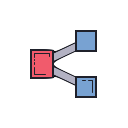Overview:
TheMux (Multiplexer) block is designed to take multiple inputs and output the first non-null value among them. It efficiently manages scenarios involving varied data sources, prioritizing values based on their availability. This block is particularly useful when integrated with a Switch Block to enable intelligent decision-making based on specific conditions.
Inputs & Outputs
| I/O | Feature | Type | Simple Explanation |
|---|---|---|---|
| input | input_1 | any | The first input value that will be evaluated for non-nullity. |
| input | input_2 | any | The second input value to be assessed alongside the first one. |
| output | output | any | The first non-null value identified among all provided input values. |
To allow accepting more than two inputs, you can click the ”+” or ”-” icon
below the input name to add or remove new input handles that you can connect
other blocks to.
Use Cases
Consider how this block enhances efficiency in various situations:- Data Prioritization: When integrating information from sensors in a smart home system, use this block to select the most relevant reading available, ensuring optimal responsiveness.
- Error Handling: In scenarios where an application retrieves user profile images from multiple sources (like local storage and cloud), utilize this block to display the first successfully loaded image while bypassing nulls.
- Config Management: For dynamically adjusting configurations based on different parameters across environments (development vs production), this tool helps prioritize values effectively without manual oversight.
Mux (Multiplexer) block proves invaluable!